 Petzlover
Petzlover Birman is originated from France but Javanese is originated from United States. Both Birman and Javanese are of same weight. Both Birman and Javanese has same life span. Both Birman and Javanese has same litter size. Birman requires Moderate Maintenance. But Javanese requires Low Maintenance
Birman is originated from France but Javanese is originated from United States. Both Birman and Javanese are of same weight. Both Birman and Javanese has same life span. Both Birman and Javanese has same litter size. Birman requires Moderate Maintenance. But Javanese requires Low Maintenance
 There isn’t clarity as to this exquisite cat’s origins. Many people believe they originated as the companions of temple priests in northern Burma.
There isn’t clarity as to this exquisite cat’s origins. Many people believe they originated as the companions of temple priests in northern Burma.
The cats somehow found their way to France, and it is believed that they have been in France since the 1920s.
The cats nearly disappeared during World War II, but luckily the remaining Birmans that survived were crossed with Siamese and Persians to strengthen the breed. In the early 1950s, pure Birnam litters were produced. It was in about 1959 that Birmans were brought to the United States.
The cats were also recognized in Britain in 1965 and in 1966 by the CFA. The first Birman cats were seal point but later other colors were brought in such as red, chocolate, and tabby.
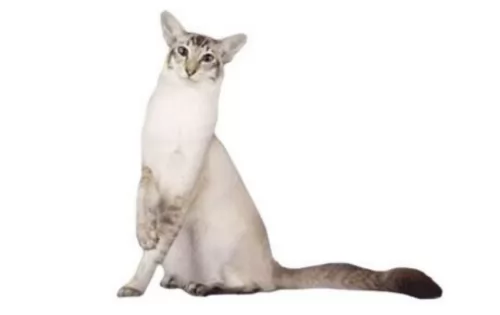 The Javanese is also known as the Colourpoint Longhair in some cat registries, but it's a purebred domestic cat that was developed in North America.
The Javanese is also known as the Colourpoint Longhair in some cat registries, but it's a purebred domestic cat that was developed in North America.
It was Helen Smith that coined the name Javanese cat in 1950 with the name being derived from the tradition where cats of the Orient have the names of the countries and islands of south-east Asia.
The name Javanese was chosen by choosing Java, an island near Bali.
 These are medium-sized cats which can become fairly large. They can weigh up to 4, 5 or 6kg. They are fairly heavily boned with a broad face and ears that are widely spaced.
These are medium-sized cats which can become fairly large. They can weigh up to 4, 5 or 6kg. They are fairly heavily boned with a broad face and ears that are widely spaced.
The round eyes are deep blue. The cat’s fur is medium-long and should be silky to the touch with no undercoat. Ther cat is a moderate shedder.
The base color is whitish to cream, but the kittens are always born white. Coat color, whether red, cream, or chocolate is always pointed and the cat always has the white paws.
The Birman isn’t as outgoing as some of the other cat breeds and its a quiet, docile intelligent cat that attaches itself to one particular family member. They can actually become jealous of their human companion and demand their attention.
These friendly cats are wonderful choices for families with children and dogs. They are calm and affectionate, and softly spoken, quietly letting you know when it’s dinner time and enjoying just being around his human family.
He is able to get along well with kids and other pets in the home. He can become quite playful too and because he is so intelligent, you can buy him some toys that require him to think.
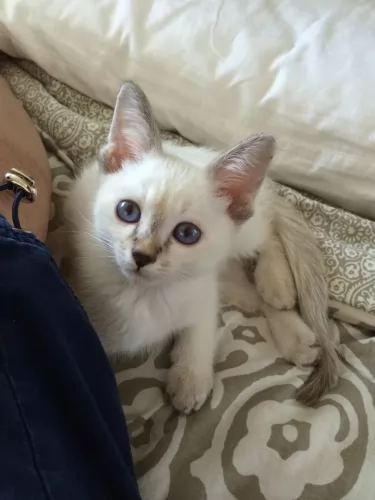 The Javanese is a medium-sized, slender, muscular cat that weighs between 3 and 6kg. It has a short or long, silky coat that comes in a number of colors. The short-haired variety has a single coat, in contrast to the double coat found in the long-haired breeds.
The Javanese is a medium-sized, slender, muscular cat that weighs between 3 and 6kg. It has a short or long, silky coat that comes in a number of colors. The short-haired variety has a single coat, in contrast to the double coat found in the long-haired breeds.
The tail is fairly plumed. The Javanese also has point coloration which means that the body is paler than the darker face. The coat comes in a variety of colors and patterns, from dark brown to cream to tortoisehell and others. The ears are large and the almond-shaped eyes are always blue.
Siamese and the Javanese differ a little in coat length and color but otherwise they are much the same in temperament. They love their human families and will follow them around like a dog.
When you sit down they like to curl up in your lap and simply be around you. They may not be as vocal as the Siamese but he is still prepared to have a jolly good conversation with you.
They’re clever cats too and like stimulating games and toys. He loves to climb, so a climbing tree will be excellent for him. He also likes being busy, so if you leave him alone for a length of time, ensure that he has activities to keep him happily amused.
If you have a Javanese be sure to include him in your activities just like you would a child of yours.
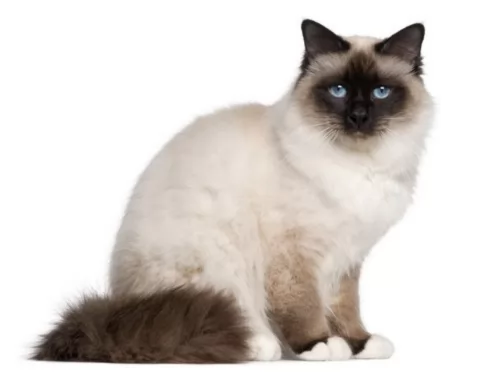 The Birman cat has to be one of the most beautiful cats there are, but the cat isn’t only a beautiful cat, it has wonderful characteristics as well.
The Birman cat has to be one of the most beautiful cats there are, but the cat isn’t only a beautiful cat, it has wonderful characteristics as well.
It is a loving, affectionate cat with his human family, loving to spend time around them. Playful and healthy, when you bring this most wonderful cat into your home, it will be as though an angel has come to stay.
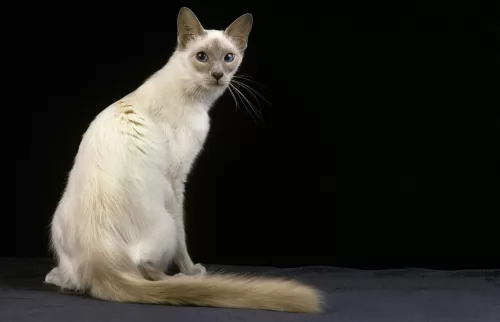 Your medium-sized Javanese cat is active and talkative. These are cats that love leaping up onto high perches and into trees and it is therefore imperative that you invest in climbing equipment for him.
Your medium-sized Javanese cat is active and talkative. These are cats that love leaping up onto high perches and into trees and it is therefore imperative that you invest in climbing equipment for him.
These slender Oriental cats need an excellent diet to maintain the fine-boned, muscular physique. You don’t want your Javanese becoming overweight as this spells bad health and sluggishness.
The Javanese is such a lively cat if his weight is maintained and he loves being around his human family, purring away while he is lovingly made a fuss of.
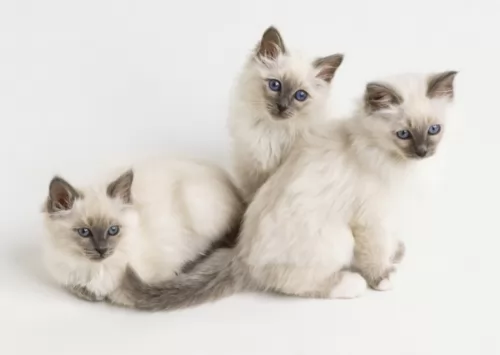 With good health your Birman can reach up to 13 years of age. With the Birman, the most serious illness is feline hypertrophic cardiomyopathy which also happens to be the most common heart disease in cats.
With good health your Birman can reach up to 13 years of age. With the Birman, the most serious illness is feline hypertrophic cardiomyopathy which also happens to be the most common heart disease in cats.
It’s a progressive disease and can result in heart failure. The cats are also at risk of developing feline infectious peritonitis.
Also, because this is a larger cat and a stocky kind of breed, it can easily put on weight and then become overweight. Strict attention will need to be given to diet as well as daily exercise.
Also, look out for Corneal dermoid - skin and hair on the surface of the cornea in one eye or in both. Luckily this is an eye problem that can be surgically corrected.
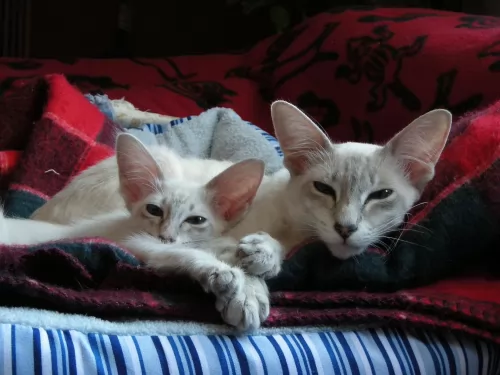 The same health issues that you’re likely to pick up with the Siamese may well be found in the Javanese too.
The same health issues that you’re likely to pick up with the Siamese may well be found in the Javanese too.
Some of the health issues to look out for include among others, asthma or bronchial disease, heart defects, lymphoma as well as gastrointestinal conditions.
For the health of your Javanese cat, make sure the vaccinations are up to date.
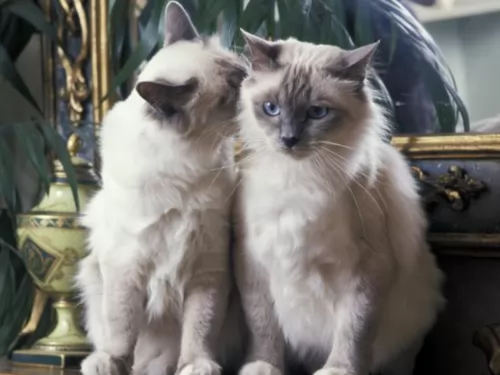 The Birman has a silky coat that sheds moderately so you want to give him a gentle brush once or twice a week to keep the coat of his soft and silky.
The Birman has a silky coat that sheds moderately so you want to give him a gentle brush once or twice a week to keep the coat of his soft and silky.
The Birman has a full topcoat, with no undercoat which means that you won’t have the coat matting or tangling.
He’ll need his nails trimmed and his teeth checked regularly. Your vet or professional groomers can do this for you and clean his teeth and check that there are no bad teeth making your pet sick.
The Birman cat has access to some great commercial cat food as there are some seriously good quality ones.
Many cat lovers choose cat foods that are AAFCO (Association of American Feed Control Officials) approved. It at least provides minimum standards for pet foods.
For your Birman you want to avoid artificial flavors and preservatives. Choose quality foods high in meat protein. As a carnivore, a cat has a huge need for meat protein. Get to know your pet food labels and choose foods with added taurine and vitamin A.
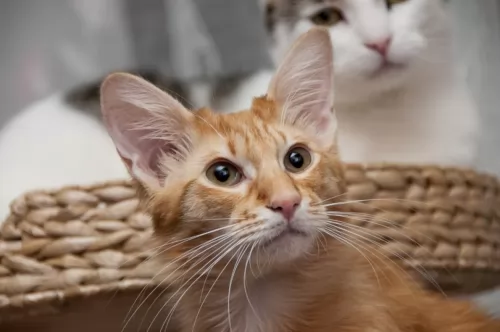 Cats are carnivores and have special dietary needs. They have unique nutritional needs, something like lions and cheetahs.
Cats are carnivores and have special dietary needs. They have unique nutritional needs, something like lions and cheetahs.
Their protein needs are very high, especially when they are kittens or nursing mothers. They need animal protein in their diets. Some of the unique nutritional needs of cats require them to have this protein as well as very important amino acids such as arginine and taurine.
Just because your cat needs such a high intake of protein, it doesn’t mean he won’t need other nutrients. Cats need balanced nutrition that is right for them. The best commercially manufactured cat food with fats, carbs, minerals, and vitamins will ensure a healthy cat. Speak to your vet if you’re not sure.
Not all cat foods are the same and choosing the right cat food will ensure your cat gets a sufficient dose of protein powder. So important is a cat’s diet for good health, that it will be important to speak to your vet about the food requirements of cats.
With grooming, the fine silky coat can be cared for easily by giving it a brush each week. You want to remove loose hairs from shedding. You can also take a damp cloth and wipe your Javanese down.
The nails will also need to be trimmed. When you brush your cat, check up on other things too.
Make sure the eyes are nice and clear, the fur soft and vibrant, make sure there are no new and unusual lumps.
Check inside his mouth for bad teeth that could be causing all kinds of health issues and check inside his ears too. For all these grooming issues, a pet grooming parlor can do it all for you.
Provide your Javanese with a litter box and keep the box scrupulously clean.